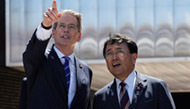LOS ANGELES - “The Social Network,” a film about the tumultuous origins of Facebook, promises a story that is as sexy and clickable as a seconds-old status update . Then again, the film - written by Aaron Sorkin and directed by David Fincher - deals in archetypes and conflicts as old as the Bible. Even while they trade on its currency, as headlines about Facebook’s astounding growth and problematic privacy issues keep coming, the makers of “The Social Network” prefer to dwell on its timelessness.
“We’re not fad hopping,” said Mr. Fincher . “There’s an ironic story behind this thing that’s about friendship and the need to connect. The fact that it was Facebook brought an interesting context for this simple drama of acrimony.”
“The Social Network,” which opens in October with various international release dates running through December, describes how Facebook, then “thefacebook,” created an alternative social hierarchy, first at Harvard University in 2004, then in the world at large. It is a battle among Mark Zuckerberg, Eduardo Saverin and Sean Parker, all founding fathers of a site that allows people to connect with old friends and new.
Once Facebook takes off, a fight for credit and lucre begins that ricochets from dorm rooms to depositions to impossibly fabulous parties. The film is set at Harvard and features Jesse Eisenberg as Zuckerberg, the film’s protagonist; Andrew Garfield as Zuckerberg’s spurned pal, Saverin; and Justin Timberlake, the music star, as Parker, the Internet impresario-genius-huckster. Using a variety of stand-in locations, Mr. Fincher draws the university as a coliseum as much as a campus.
Language, social status, study clubs are used as weapons, even as Mr. Zuckerberg introduces a new element ? technology ? as the ultimate equalizer. “I think the fact that it was Harvard is by no means irrelevant,” Mr. Sorkin said. “The genesis of the idea was exclusivity, of an outsider wanting to belong.” Mr. Fincher said genuine revolutions are frequently met with condescension.
“I know very subjectively what it’s like to be 21 years old and sitting in a room full of adults who are all talking about how cute your passion for your vision is, and how angry that makes you,” he said. “A certain kind of young person is going to respond by saying, ‘Let’s knock the walls of this thing down, set fire to the conventional wisdom and take the future for a test drive.’ ” Like Mr. Fincher, Mr. Sorkin is far from charmed by the potential of social networking - “I think the way we were communicating before seemed just fine” - but was taken by the phenomenon’s scale and its peculiar dramatics .
As depicted in the film Zuckerberg begins with a single actual friend, Mr. Saverin, and then sacrifices that friendship on the way to creating the largest engine of social interaction in the history of mankind. Mr. Sorkin called the story “awfully ironic,” noting, “These were people whose social lives blew apart as a result of what they were trying to do.
” After immersing the filmgoer in an eroticized, hierarchical Harvard, the film uses court depositions, both as a source and a device, to suggest that the players may all be sitting at the same table, but they are far from agreeing on what lies in the middle of it. When Scott Rudin, one of the film’s producers, looks at Facebook, he doesn’t see revolution or unprecedented business success, he sees an allegory.
“Facebook,” he said, “is something you can hold it up to the light and turn it to the right or left, and it becomes a metaphor for some very big things: The nature of communication. What is friendship? What is the nature of loneliness?”
스마터리빙
more [ 건강]
[ 건강]이제 혈관 건강도 챙기자!
[현대해운]우리 눈에 보이지 않기 때문에 혈관 건강을 챙기는 것은 결코 쉽지 않은데요. 여러분은 혈관 건강을 유지하기 위해 어떤 노력을 하시나요?
 [ 건강]
[ 건강]내 몸이 건강해지는 과일궁합
 [ 라이프]
[ 라이프]벌레야 물럿거라! 천연 해충제 만들기
 [ 건강]
[ 건강]혈압 낮추는데 좋은 식품
[현대해운]혈관 건강은 주로 노화가 진행되면서 지켜야 할 문제라고 인식되어 왔습니다. 최근 생활 패턴과 식생활의 변화로 혈관의 노화 진행이 빨라지고
사람·사람들
more
“취미생활로 다진 친목… 선후배들과 만든 모교사랑”
사진러브한인 사진 동호회 사진러브(회장 크리스 고)는 13일 용수산에서 송년모임을 갖고 한 해를 마무리하는 뜻깊은 시간을 가졌다. 이날 모임에…

[홀인원] 이상원 박사
일반외과 전문의 이상원(왼쪽) 박사가 지난 9일 뉴포트비치 소재 골프장 9번 홀(152야드)에서 레스큐 클럽으로 친 샷이 그대로 홀에 빨려 들…
[송년행사 게시판] 재미시인협회
재미시인협회(회장 지성심)는 오는 20일 오후 4시 가든스윗호텔에서 한 해를 마무리하며 동인지 ‘외지’ 제35집 출판 기념회와 ‘제23회 재미…
[송년행사 게시판] 향군단체 연합
6.25 참전유공자회와 대한민국 육군협회 등 남가주 지역 향군 단체 연합은 19일 오전 11시30분, 용궁에서 송년 행사를 개최한다. 드레스코…
[송년행사 화보] “이웃과 함께 나누고 지인과 함…
KYCC13일 윌튼 플레이스 초등학교에서 열린 ‘한인타운청소년회관(KYCC) 홀리데이 카니발’이 성황리에 막을 내렸다. 올해는 KYCC 창립 …
많이 본 기사
- “1인당 2,000달러 환급금·세금 … 3
- ‘반이민 가속페달’⋯ 시민권자도 대거 추방
- ‘수퍼 독감’ 확산… 확진 4배 급증
- 센터빌 식당서 벌써 4% 부과 ‘말썽’
- 전현무, 차량 링거 결국 입 열었다.. “의사 진료 처방..불법 NO”
- ‘뇌종양 투병’ 윤석화, 끝내 별세..향년 69세
- 캐롤라이나 항공기 추락 조종사·일가족 7명 사망
- 시민권 박탈 착수⋯매달 200명
- 뉴욕-뉴저지 다리· 터널 통행료 또 오른다
- 한인 부인 살해 혐의 남편 법정 출두 무죄 주장
- 퀸즈장로교회 ‘사랑의 바구니’130개 이웃에 전달
- 트럼프 행정부, 대마초 규제 완화
- 이재용 아들의 시민권 포기가 불러온 오해
- 시신 훔쳐 팔아넘긴 부부 징역 중형 1
- 뉴욕한인회 곽호수 이사장 ‘회장 판공비 논란’ 전격사임
- “암 검진 본인 부담금 폐지”
- 베네수엘라, 해군에 “유조선 호위하라”
- 한인 헤지펀드 거물, CNN 인수 추진
- 구리 절도 기승⋯ 가로등 ‘깜깜’
- 박수홍 친형, 2심서 징역 3년 6개월 법정구속..형수 오열
- 한국연극배우협회 “윤석화 별세 사실 아냐”…보도자료 정정·사과
- “첼시 판 돈 우크라에 쓰라” 영국, 러 재벌에 최후 통첩
- “연대의 빛으로 증오 극복”
- 연말이 되면 사라지는 선택들
- 거주·투자용 한국 부동산 인기… 한인 유치 ‘치열’
- ‘재무장 선언’ 독일, 군장비 대거 구매
- 트럼프 생일날 전국 국립공원 입장 무료
- 뉴욕반석교회, 주님의 식탁선교회에 1만1,540달러 기탁
- 40·50대 은퇴, 자산은 있는데 확신은 없다
- 월드컵 입장권 폭등 비판 FIFA, ‘60달러’ 티켓 발매
- 미동부한인스키협회 스키 강사 클리닉
- 김민선 백악관 자문위원 백악관 연말 파티 참석
- ‘주사이모’ 의혹에 입짧은햇님도 활동 중단… “의사라고 믿었다”
- 뉴욕크로마하프연주단, 하크네시야교회서 정기연주회
- 음문석, ‘모범택시3’로 보여준 새로운 얼굴
- 한인 다큐 감독 크리스틴 최 별세
- 홍명보호, 최소 1,050만 달러… 8강 진출 시 2,050만 달러‘잭팟’
- 장애인 예술단체 ‘리디스커버 아티스트’ 그룹전
- 천정궁엔 언제? 시계는 어디에?…전재수 불렀지만 첩첩산중
- 내년 금리인하 전망… 연준 1회, 시장은 2회
- [금요단상] AI와 동거, 그 실체
- “이웃 돌보는 여러분이 동역자”
- AWCA 자원봉사자 감사의 밤
- 페어팩스, 낙엽·잔디 폐기물 수거 일시 중단
- 팀스피릿 부동산그룹 송년모임
- 뉴욕주 차량운전자 벌점 규정 대폭 강화
- 한국타이어, 테네시공장 증설… 생산 두배로
- “취미생활로 다진 친목… 선후배들과 만든 모교사랑”
- 소기업 지원에 1천만 달러 투자
- 오스카 시상식, 2029년부터 유튜브 생중계
1/5지식톡

-
 ☝️해외에서도 가능한 한국어 선생님…
0
☝️해외에서도 가능한 한국어 선생님…
0이 영상 하나면 충분합니다!♥️상담신청문의♥️☝️ 문의 폭주로 '선착순 상담'만 진행합니다.☎️ : 02-6213-9094✨카카오톡ID : @GOODEDU77 (@골뱅이 꼭 붙여주셔야합니다…
-
 테슬라 자동차 시트커버 장착
0
테슬라 자동차 시트커버 장착
0테슬라 시트커버, 사놓고 아직 못 씌우셨죠?장착이 생각보다 쉽지 않습니다.20년 경력 전문가에게 맡기세요 — 깔끔하고 딱 맞게 장착해드립니다!장착비용:앞좌석: $40뒷좌석: $60앞·뒷좌석 …
-
 식당용 부탄가스
0
식당용 부탄가스
0식당용 부탄가스 홀세일 합니다 로스앤젤레스 다운타운 픽업 가능 안녕 하세요?강아지 & 고양이 모든 애완동물 / 반려동물 식품 & 모든 애완동물/반려동물 관련 제품들 전문적으로 홀세일/취급하는 회사 입니다 100% …
-
 ACSL 국제 컴퓨터 과학 대회, …
0
ACSL 국제 컴퓨터 과학 대회, …
0웹사이트 : www.eduspot.co.kr 카카오톡 상담하기 : https://pf.kakao.com/_BEQWxb블로그 : https://blog.naver.com/eduspotmain안녕하세요, 에듀스팟입니다…
-
 바디프렌드 안마의자 창고 리퍼브 세…
0
바디프렌드 안마의자 창고 리퍼브 세…
0거의 새제품급 리퍼브 안마의자 대방출 한다고 합니다!8월 23일(토)…24일(일) 단 이틀!특가 판매가Famille: $500 ~ $1,000Falcon: $1,500 ~ $2,500픽업 & 배송직접 픽업 가능LA…
케이타운 1번가
오피니언
 한영일 / 서울경제 논설위원
한영일 / 서울경제 논설위원[만화경] 웰다잉 인센티브
 캐슬린 파커 워싱턴포스트 칼럼니스트
캐슬린 파커 워싱턴포스트 칼럼니스트 [캐슬린 파커 칼럼] 아이들을 온라인에서 보호하기
 양상훈 수필가ㆍ시인
양상훈 수필가ㆍ시인 [한국춘추] 경제대공황ㆍ제2차 세계대전 승리로 극복한 루스벨트 리더쉽

[왈가 왈부] 고환율에 외환 건전성 완화·서학개미 규제… 미봉책 아닌가요
 수잔 최 한미가정상담소 이사장 가정법 전문 변호사
수잔 최 한미가정상담소 이사장 가정법 전문 변호사 [수잔 최 변호사의 LIFE &] AI 시대 편리함에 안주하지 말자
 김도년 성균관대 건축학과 교수 스마트도시·건축학회장
김도년 성균관대 건축학과 교수 스마트도시·건축학회장 [로터리] 지멘스가 만드는 미래 동네
1/3지사별 뉴스

퀸즈장로교회 ‘사랑의 바구니’130개 이웃에 전달
퀸즈장로교회가 18일 크리스마스를 앞두고 교인들의 정성과 사랑이 듬뿍 담긴 ‘사랑의 바구니’ 130개를 소방서와 경찰서, 요양원, 선교회, 그…
시민권 박탈 착수⋯매달 200명

“이웃 돌보는 여러분이 동역자”
워싱턴성광교회(담임목사 임용우)는 18일 한인단체와 소방서‧도서관 등에 총 2만9천 달러의 성금을 전달했다. 지난 2011년부터 15년째 지역…
소기업 지원에 1천만 달러 투자

베이지역 스포츠팀, SF 한인회에 후원금
샌프란시스코 베이지역 한인회(회장 김한일)는 한인 메이저리거 이정후 선수의 소속팀인 샌프란시스코 자이언츠(San Francisco Giants…
불자커뮤니티 20일 청소년발표회및 송년회

오늘 하루 이 창 열지 않음 닫기 




















































.png)


댓글 안에 당신의 성숙함도 담아 주세요.
'오늘의 한마디'는 기사에 대하여 자신의 생각을 말하고 남의 생각을 들으며 서로 다양한 의견을 나누는 공간입니다. 그러나 간혹 불건전한 내용을 올리시는 분들이 계셔서 건전한 인터넷문화 정착을 위해 아래와 같은 운영원칙을 적용합니다.
자체 모니터링을 통해 아래에 해당하는 내용이 포함된 댓글이 발견되면 예고없이 삭제 조치를 하겠습니다.
불건전한 댓글을 올리거나, 이름에 비속어 및 상대방의 불쾌감을 주는 단어를 사용, 유명인 또는 특정 일반인을 사칭하는 경우 이용에 대한 차단 제재를 받을 수 있습니다. 차단될 경우, 일주일간 댓글을 달수 없게 됩니다.
명예훼손, 개인정보 유출, 욕설 등 법률에 위반되는 댓글은 관계 법령에 의거 민형사상 처벌을 받을 수 있으니 이용에 주의를 부탁드립니다.
Close
x